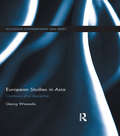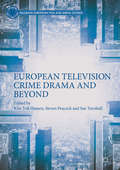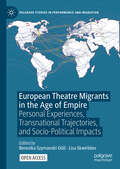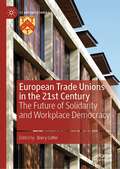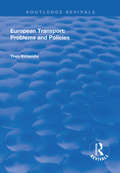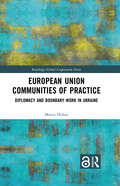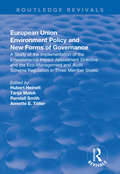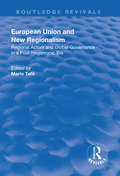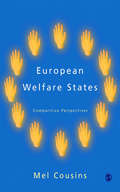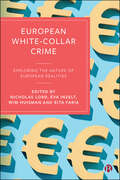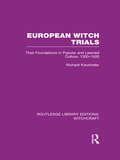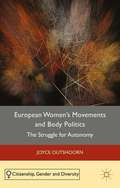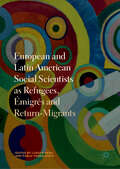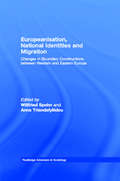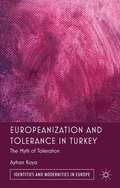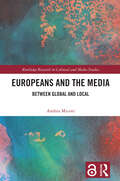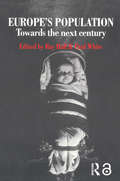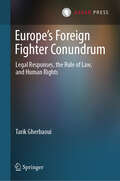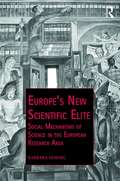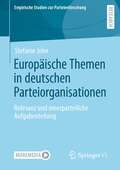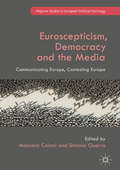- Table View
- List View
European Studies in Asia: Contours of a Discipline (Routledge Contemporary Asia Series)
by Georg WiessalaAs countries across Asia continue to rise and become more assertive global powers, the role that Higher Education has played, and continues to play, in this process is an issue of growing pertinence. Furthermore, understanding the relationship between Europe and Asia fostered by historical and contemporary knowledge transfer, including Higher Education, is crucial to analysing and encouraging the progress of both regional integration and inter-regional cooperation. With a specific focus on international Higher Education, European Studies in Asia investigates knowledge transfer and channels of learning between Europe and Asia from historical, contemporary and teaching perspectives. The book examines a selection of significant historical precedents of intellectual dialogue between the two regions and, in turn, explores contemporary cross-regional discourses both inside and outside of the official frameworks of the European Union (EU) and the Asia--Europe Meetings (ASEM). Drawing on extensive case studies based on many of his own teaching experiences, Georg Wiessala addresses key questions, such as the nature and construction of the European Studies in Asia curriculum; aspects of ‘values’, co-constructed learning and adult pedagogy in the discipline of European Studies in Asia; the politics of Asian host cultures, the ‘internationalization’ of Asian Higher Education and the experiences and expectations of tertiary sector students of this subject in Asia, Australia and New Zealand. In doing so, the author articulates a range of outcomes for the further development of Higher Education cooperation agendas between Asia and Europe, in the discipline of European Studies, and in related fields such as International Relations. This case study-led book makes an original and novel contribution to our understanding of European Studies in Asia. As such, it will be of great interest to students and scholars of Asian Education, Comparative Education, European Studies and International Relations.
European Television Crime Drama and Beyond (Palgrave European Film and Media Studies)
by Steven Peacock Kim Toft Hansen Sue TurnbullThis book is the first to focus on the role of European television crime drama on the international market. As a genre, the television crime drama has enjoyed a long and successful career, routinely serving as a prism from which to observe the local, national and even transnational issues that are prevalent in society. This extensive volume explores a wide range of countries, from the US to European countries such as Spain, Italy, the Scandinavian countries, Germany, England and Wales, in order to reveal the very currencies that are at work in the global production and circulation of the TV crime drama. The chapters, all written by leading television and crime fiction scholars, provide readings of crime dramas such as the Swedish-Danish The Bridge, the Welsh Hinterland, the Spanish Under Suspicion, the Italian Gomorrah, the German Tatort and the Turkish Cinayet. By examining both European texts and the ‘European-ness’ of various international dramas, this book ultimately demonstrates that transnationalism is at the very core of TV crime drama in Europe and beyond.
European Theatre Migrants in the Age of Empire: Personal Experiences, Transnational Trajectories, and Socio-Political Impacts (Palgrave Studies in Performance and Migration)
by Berenika Szymanski-Düll Lisa SkwirbliesThis open access edited volume constitutes the first historical study of the phenomenon of European theatre migration, and thus contributes in new and important ways to the formation of a historical discourse on theatre and migration. The hidden histories of European theatre migration that this book seeks to explore allow us to rethink global theatre history as a history of mobility with Europe as the point of departure rather than the point of arrival. It also allows the reader to challenge and to decenter a European self-understanding of insularity and a European cosmopolitanism ignorant of its imperial and colonial roots.
European Trade Unions in the 21st Century: The Future of Solidarity and Workplace Democracy (St Antony's Series)
by Barry ColferTrade unions in Europe face a range of cross-cutting challenges. This includes the near-universal contraction in union membership; the related decline of traditionally highly unionised blue-collar industries; and the rise of automation, microprocessing, and digitalisation, which can make it cheaper for employers to invest in machines than to pay humans to work. The breakdown of the standard contract of employment and increasing rates of precarious work have further transformed the world of work. Taken together, this makes any collectivist vision of society, and the notion of solidarity upon which trade unionism is built, difficult to sustain.All this raises tough questions for trade unionists, policy-makers, and researchers alike regarding the future of trade unions, the oldest and largest civil society movement in Europe. The contributions in this volume explore the prospects for union revival across a range of cases, including by focusing on the pursuit of legal remedies and on the opportunities associated with the network society to defend the interests of workers. This interdisciplinary volume includes contributions that consider the Czech Republic, Denmark, France, Finland, Germany, Spain, Sweden, Poland, the United Kingdom, and the EU level by researchers coming from a range of disciplines and backgrounds. The volume should especially appeal to researchers and practitioners working in the fields of political science, sociology, law, and business studies.
European Transport: Problems and Policies (Routledge Revivals)
by Theo KiriazidsFirst published in 1994, this volume responds to a key debate in the European Community, extant since the signing of the Single European Act (SEA) in 1986, in exploring the role of transportation in the creation of a Common Market with free movement of goods, people, capital and services. Critical of the EC’s compromise on transport between economic principles and political realities, this book seeks to address issues of international cooperation, lack of common approach and differences in national law and political systems along with the question of finance. Theo Kiriazidis responds to the EC’s argument on each transport sector in turn and examines how the existing transport system in 1994 could be better managed.
European Union Communities of Practice: Diplomacy and Boundary Work in Ukraine (ISSN)
by Maren HofiusThis book provides a practice-based analysis of European Union (EU) diplomacy and community-building. Unlike studies focusing on how EU community-building proceeds centrally in Brussels, this book turns to EU diplomacy in its bordering state of Ukraine. At a time when the EU’s internal cohesion is being put to the test, this book provides novel insights into how feelings of belonging are produced amongst its members in the absence of a homogenous ‘we’. Transcending the traditional dichotomy between macro-structures and micro-processes of interaction, the book demonstrates that the EU’s large-scale community depends for its existence on practical instantiations of community-building in distinct ‘communities of practice’. Using the case of an EU diplomatic ‘community of practice’ in Kyiv, Ukraine, takes these questions to the EU’s margins, highlighting that the boundaries of community are key sites in which community materialises. The in-depth case study identifies diplomats’ ‘boundary work’ as the constitutive rule that makes the local ‘community of practice’ cohere and create feelings of belonging to the large-scale polity of the EU. This book will be of interest to researchers of European studies, as well as to those working on global cooperation and international relations more broadly.
European Union Communities of Practice: Diplomacy and Boundary Work in Ukraine (Routledge Global Cooperation Series)
by Maren HofiusThis book provides a practice-based analysis of European Union (EU) diplomacy and community-building. Unlike studies focusing on how EU community-building proceeds centrally in Brussels, this book turns to EU diplomacy in its bordering state of Ukraine. At a time when the EU’s internal cohesion is being put to the test, this book provides novel insights into how feelings of belonging are produced amongst its members in the absence of a homogenous ‘we’. Transcending the traditional dichotomy between macro-structures and micro-processes of interaction, the book demonstrates that the EU’s large-scale community depends for its existence on practical instantiations of community-building in distinct ‘communities of practice’. Using the case of an EU diplomatic ‘community of practice’ in Kyiv, Ukraine, takes these questions to the EU’s margins, highlighting that the boundaries of community are key sites in which community materialises. The in-depth case study identifies diplomats’ ‘boundary work’ as the constitutive rule that makes the local ‘community of practice’ cohere and create feelings of belonging to the large-scale polity of the EU. This book will be of interest to researchers of European studies, as well as to those working on global cooperation and international relations more broadly.
European Union Environment Policy and New Forms of Governance: A Study of the Implementation of the Environmental Impact Assessment Directive and the Eco-management and Audit Scheme Regulation in Three Member States (Routledge Revivals)
by Hubert HeineltThis title was first published in 2001. Outlining the results of a three-country study, this text examines the impact of EU policy on the domestic, political and institutional environment. It tests ideas about new forms of governance that reflect the values of participation and empowerment of local interests, particularly through a close scrutiny of the environmental impact process. The book also analyzes the responses of the business sector in three countries - Germany, Greece and Great Britain - to the introduction of a voluntary environmental management system, the eco-management and audit scheme.
European Union and New Regionalism: Europe and Globalization in Comparative Perspective (Routledge Revivals)
by Mario TelòThis title was first published in 2001. This is a collection of papers that look at the structure of the global economy, and its changing paradigms over the years. The contributors look at how the classic concept of state - autonomous, sovereign and freed of all constraint - never really reflected the reality of the international scene, despite the role it has played in realist and neo-realist theory for many decades. Instead, they consider that the political, social and economic characteristics originally attributed to states seem increasingly to be expressed through regional constructs. The papers in this volume show that even within regionalism there are a variety of different models that exist, and examine five of those models: the European Union; Mercosul-Mercosur; the North American Free Trade Area (NAFTA); the Association of South East Asian Nations (ASEAN); and the South African Development Community (SADC).
European Welfare States: Comparative Perspectives
by Mel CousinsBringing together a discussion of the theories and techniques of comparative policy analysis and a description of current developments in selected welfare state regimes, European Welfare States provides an accessible overview of issues concerning European welfare states. In particular, it provides: - an overview of the development of welfare states in Europe; - a discussion of key issues including welfare state theories, the role of globalization, gender and the welfare state; welfare typologies; and the role of public opinion; - a detailed account of recent developments and current challenges in five European welfare states; and - a detailed account of the key challenges facing European welfare states and possible future directions for welfare models including the role of the European Union in the development of social policy. This book is illustrated throughout with student-friendly features such as case-studies, chapter summaries, questions for discussion and guides for further reading. With a flowing narrative and clear structure the book is an invaluable text for undergraduates taking courses in comparative social policy. It will also be useful for students in related disciplines such as public policy, social welfare, politics and international relations.
European White-Collar Crime: Exploring the Nature of European Realities
by Nicholas LordFrom corporate corruption and the facilitation of money laundering, to food fraud and labour exploitation, European citizens continue to be confronted by serious corporate and white-collar crimes. Presenting an original series of provocative essays, this book offers a European framing of white-collar crime. Experts from different countries foreground what is unique, innovative or different about white-collar and corporate crimes that are so strongly connected to Europe, including the tensions that exist within and between the nation-states of Europe, and within the institutions of the European region. This European voice provides an original contribution to discourses surrounding a form of crime which is underrepresented in current criminological literature.
European Witch Trials: Their Foundations in Popular and Learned Culture, 1300-1500 (Routledge Library Editions: Witchcraft)
by Richard KieckheferIn popular tradition witches were either practitioners of magic or people who were objectionable in some way, but for early European courts witches were heretics and worshippers of the Devil. This study concentrates on the period between 1300 and 1500 when ideas about witchcraft were being formed and witch-hunting was gathering momentum. It is concerned with distinguishing between the popular and learned ideas of witchcraft. The author has developed his own methodology for distinguishing popular from learned concepts, which provides adequate substantiation for the acceptance of some documents and the rejection of others. This distinction is followed by an analysis of the contents of folk tradition regarding witchcraft, the most basic feature of which is its emphasis on sorcery, including bodily harm, love magic, and weather magic, rather than diabolism. The author then shows how and why learned traditions became superimposed on popular notions – how people taken to court for sorcery were eventually convicted on the further charge of devil worship. The book ends with a description of the social context of witch accusations and witch trials.
European Women?�s Movements and Body Politics
by Joyce Outshoorn Radka Dudov� Ana Prata Lenita FreidenvallTaking a long-term historical view, this book examines how women's and feminist movements have contested the dominant discourses and state politics that have impeded women's autonomy over their bodies since the late 1960s. Citizenship is usually understood as guaranteeing political, social and economic rights, but women's movements have sought to extend it to include women's rights to bodily integrity. This book examines two important facets of this struggle, namely prostitution and the right to abortion, as they relate to four countries- the Czech Republic, the Netherlands, Portugal and Sweden- with special attention paid to how migration and Europeanization has affected political debates and policies. The authors show how policy legacies from the past partly determine outcomes, but also how women's groups have been key to policy change. They also make the case for expanding how we define citizenship to include bodily integrity, reinforcing women's right to autonomy in this new era of biotechnological revolution.
European and International Media Law
by Jan OsterThis book is the first to incorporate current academic literature and case law on European, transnational, and international media law into a comprehensive overview intended primarily for students. It introduces the legal framework for globalised communication via mass media, and considers the transformative effect globalisation has had on domestic media law. Engaging case examples at the beginning of each chapter, and questions at the end, give students a clearer idea of legal problems and encourage them to think critically. A wide variety of topics - including media economics, media technology, and social norms concerning media publications - are discussed in relation to media law, and numerous references to case law and suggestions for further reading allow students to conduct independent research easily.
European and Latin American Social Scientists as Refugees, Émigrés and Return‐Migrants
by Ludger Pries Pablo YankelevichDuring the 1930s, thousands of social scientists fled the Nazi regime or other totalitarian European regimes, mainly towards the Americas. The New School for Social Research (NSSR) in New York City and El Colegio de México (Colmex) in Mexico City both were built based on receiving exiled academics from Europe. Comparing the first twenty years of these organizations, this book offers a deeper understanding of the corresponding institutional contexts and impacts of emigrated, exiled and refugeed academics. It analyses the ambiguities of scientists’ situations between emigration, return‐migration and transnational life projects and examines the corresponding dynamics of application, adaptation or amalgamation of (travelling) theories and methods these academics brought. Despite its institutional focus, it also deals with the broader context of forced migration of intellectuals and scientists in the second half of the last century in Europe and Latin America. In so doing, the book invites a deeper understanding of the challenges of forced migration for scholars in the 21st century.
Europeanisation, National Identities and Migration: Changes in Boundary Constructions between Western and Eastern Europe (Routledge Advances in Sociology #Vol. 5)
by Anna Triandafyllidou Willfried SpohnThis book provides theoretical and empirical discussion of migration, identity and Europeanisation. With contributions from leading international scholars, it provides both an overview of theoretical perspectives and a comprehensive set of case studies, covering both Eastern and Western Europe. Contributors draw from disciplines such as historical sociology, discourse analysis, social psychology and migration studies, while the editors bring these subjects into a coherent theoretical and historical framework, to discuss the emergence of new collective identities and new borders in Europe today.
Europeanization and Tolerance in Turkey
by Ayhan KayaThe book questions the popularity of the notion of tolerance in Turkey, and argues that the regime of tolerance has been strengthened in parallel with the Europeanization process, which has boosted the rhetoric of the Alliance of Civilizations in a way that culturalized what is social and political.
Europeanization, Care and Gender
by Anne Kovalainen Hanne Marlene Dahl Marja KeränenThiscollection addresses the complexity of care arrangements in contemporaryEurope, developingnew insights into debates about the care crisis, gender equality, the division of work and the reconciliation of care and work. "
Europeans and the Media: Between Global and Local (Routledge Research in Cultural and Media Studies)
by Andrea MiconiThis book investigates the relationship between the process of Europeanization – the expected rise of a common culture – and the role played by the media in the different regions.Drawing on a comparative model, the analysis is structured around frameworks related to the action of the media in shaping national identities; to the world-system theory, based on the hierarchization of geographical spaces; and to the regional patterns identified in scientific literature. The analysis draws on data collected from numerous markets and across a variety of media formats, to detect the geographical pattern that results from the diffusion of different technologies and cultural contents: the national, the regional, the European, and the global.This nuanced and insightful volume will interest students and scholars in the field of communication studies, European studies, and comparative media studies.The Open Access version of this book, available at www.taylorfrancis.com, has been made available under a Creative Commons Attribution-Non-Commercial (CC-BY-NC) 4.0 license.
Europes Population: Towards The Next Century
by Paul White Ray HallFirst published in 1995. Routledge is an imprint of Taylor & Francis, an informa company.
Europe’s Foreign Fighter Conundrum: Legal Responses, the Rule of Law, and Human Rights
by Tarik GherbaouiThis book explores how Europe can resolve its foreign fighter conundrum without losing its credibility as a guardian of the rule of law and human rights. Centring on European foreign fighters who travelled to the armed conflict in Syria and Iraq, this book examines to which extent legal responses to the security threat posed by foreign fighters have been consistent with the rule of law and human rights. The transnational nature of the foreign fighter phenomenon has created a messy labyrinth of legal obligations at the international, European, and domestic levels. To dissect this multi-layered counter-terrorism architecture, the book analyses the intricate interplay between legal norms at these different levels, with a special focus on prosecution and citizenship deprivation. Pertinent issues discussed in this book include multilateral responses by the United Nations, the European Union, and the Council of Europe, as well as the interplay between the ‘foreign terrorist fighter’ concept and definitions of terrorism. The book also addresses the conflation between counter-terrorism law and international humanitarian law, and the increasing preventive shift within counter-terrorism law. Drawing on insights from various fields of law, the book's comprehensive and thorough assessment of the rule of law and human rights implications of permanent international, regional, and domestic legal measures to foreign fighters offers best practices for managing future terrorist threats and challenges. It is an essential resource for both researchers and practitioners in the field of counter-terrorism, national and international security, and international law. Tarik Gherbaoui is a Researcher in international law in the Research Department of the T.M.C. Asser Instituut in The Hague, the Netherlands.
Europe’s Migrant Policies
by Suzanne MulcahyEurope is becoming increasingly anxious about issues of immigration and immigrant integration. Bans on the construction of minarets in Switzerland, prohibition of the wearing of face-covering veils in Belgium and crackdowns on Roma migrants in France and Italy are all signs of the growing prominence of the issue. Apart from these headline-grabbing policies, many European countries have also been imposing civic integration policies on migrants and restricting their rights to participate in public life. What is driving such policies at the national level? And where does the EU fit into this picture? This book provides a comparative analysis of the impact of the EU, if any, on the policies and politics of immigrant integration in its member states. It investigates whether the EU can be a force for good in a policy area until now thought to be at the discretion of member states.
Europe’s New Scientific Elite: Social Mechanisms of Science in the European Research Area (Public Intellectuals and the Sociology of Knowledge)
by Barbara HoenigWinner of the Harald Kaufmann Prize for Senior Researchers, 2018 This book examines the question of whether the process of European integration in research funding has led to new forms of oligarchization and elite formation in the European Research Area. Based on a study of the European Research Council (ERC), the author investigates profound structural change in the social organization of science, as the ERC intervenes in public science systems that, until now, have largely been organized at the national level. Against the background of an emerging new science policy, Europe’s New Scientific Elite explores the social mechanisms that generate, reproduce and modify existing dynamics of stratification and oligarchization in science, shedding light on the strong normative impact of the ERC’s funding on problem-choice in science, the cultural legitimacy and future vision of science, and the building of new research councils of national, European and global scope. A comparative, theory-driven investigation of European research funding, this book will appeal to social scientists with interests in the sociology of knowledge.
Europäische Themen in deutschen Parteiorganisationen: Relevanz und innerparteiliche Aufgabenteilung (Empirische Studien zur Parteienforschung)
by Stefanie JohnStefanie John untersucht, in welcher Weise sich die Vielfalt europäischer politischer Angelegenheiten in der Politikartikulation von ausgewählten deutschen Parteien niederschlägt und ob innerhalb der Parteien eine Art Aufgabenteilung existiert, wonach zentrale innerparteiliche Akteure unterschiedliche europäische Themen zum Gegenstand ihrer Politikartikulation machen. Konkret wird hier die Politikartikulation von Parteitag, Parteiführung und Fraktion theoretisch reflektiert und empirisch untersucht. Die empirische Untersuchung beruht auf einer umfänglichen Analyse politischer Dokumente und deckt einen Analysezeitraum von zehn Jahren ab. Es kommen unter anderem neu entwickelte Indizes zum Einsatz, um Muster einer innerparteilichen Aufteilung von politischen Themen aufzudecken. Es zeigt sich, dass sich in der Politikartikulation der drei Parteiakteure die europäische Themenvielfalt widerspiegelt, die von Polity-Fragen bis zu Policy-Themen in zahlreichen Politikfeldern reicht. Aufgedeckte Muster belegen die Existenz einer innerparteilichen Aufgabenteilung in der Politikartikulation. Diese Muster zeigen sich in weiten Teilen unabhängig vom Parteiorganisationsverständnis der Parteien.
Euroscepticism, Democracy and the Media
by Manuela Caiani Simona GuerraThis volume focuses on the relationship between the media and European democracy, as important factors of EU legitimacy. The contributors show how the media play a crucial role in making European governance accountable, and how it can act as an intermediate link between citizens and their elected and unelected representatives. The book focuses on widespread levels of Euroscepticism and the contemporary European crisis. The authors present empirical studies which problematize the role of traditional media coverage on EU attitudes. Comparisons are also drawn between traditional and new media in their influence on Euroscepticism. Furthermore, the authors analyse the impact of the internet and social media as new arenas in which Eurosceptic claims and positions can be made visible, as well as being a medium used by political parties and populist movements which contest Europe and its politics and policies. Euroscepticism, Democracy and the Media will be of interest to students and scholars with an interest in European politics, political parties, interest groups, social movements and political sociology.
